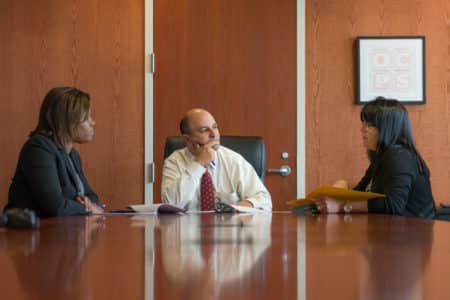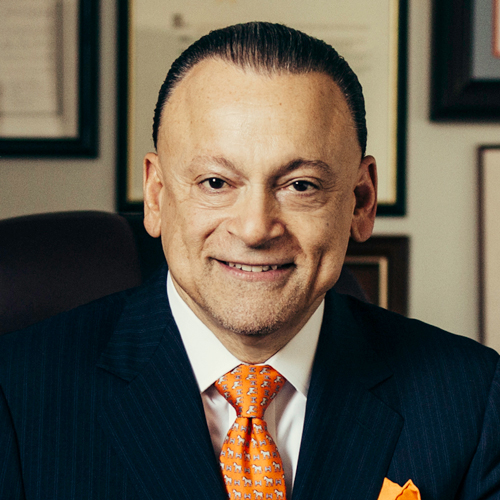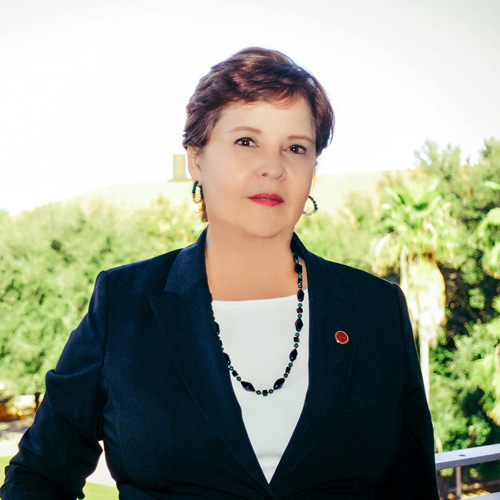Diego Rodriguez, or “Woody” to those who know him, has both a personal and a professional connection with the Orange County Public Schools (OCPS). He serves the school system as general counsel, and his two children attend public schools in Orange County, Florida.
“My daughter is in ninth grade, and my son is in fifth,” he says. “So, I am really involved with what goes on in the district at different grade levels. I get to know firsthand when the system works and when it doesn’t.”
Prior to joining the district, Rodriguez served as general counsel to the Orange County Supervisor of Elections Bill Cowles. When Rodriguez took his current position in 2010, he had a vision for the district: to be the top producer of successful students in the nation. Seven years later, the results speak for themselves. Fifteen Orange County public high schools were on the Washington Post’s list of most academically rigorous schools, and six are in the top 10 percent of high-performing schools in the country.
“The Great Equalizer”

OCPS is remarkable not only because of its size—it is the tenth largest school district in the United States and the fourth largest in the state—but also because of the diversity of its student body.
“Students speak 167 different languages, and they come from 200 countries/regions,” Rodriguez says. “This is truly a multiethnic environment where young people of different backgrounds and cultures get together to learn.”
Rodriguez firmly believes that education is “the great equalizer”—he is living proof of it. His parents, both Cuban, came to the United States in the sixties ready to start a new life with very little.
“They didn’t have much formal education,” Rodriguez says. “There was no inheritance from Cuba either. My dad was a printer and worked hard all his life. I feel blessed that he and my mother taught me strong work ethics and values.”
Orange County
Public Schools (OCPS)
By the Numbers
OCPS is Central Florida’s second-largest employer, with around 23,000 employees.
OCPS provides instruction to about 200,000 students.
There are over 186 schools in the OCPS system.
OCPS uses 916 buses every day.
More than one-third of OCPS teachers hold an advanced degree.
The OCPS district serves 165,300 meals per day, or 30.2 million annually.
Graduation rate for the OCPS district’s traditional high schools was about 5% higher than the national average at the end of the last school year.
Over $474 million is budgeted through 2020 for planning, designing, and building for OCPS.
Later on, Rodriguez learned about the challenges faced by the educational system in Florida through his mother-in-law, who was an elementary school principal in Orange County.
“I realized that there was a need for good lawyers to help guide the institution,” he says. “I took this job because I wanted to make an impact. Now, I feel that I’m in the right place at the right time.”
Putting a Face on Legal
The first order of business when Rodriguez started working for OCPS was changing the department’s name from the Office of the General Counsel to the Office of Legal Services.
“I didn’t want the focus to be on just one person,” he says. “It was important to market our services to administrators, principals, assistant principals, and other people who could benefit from them.”
Three years ago, his department began offering Legal Services 101, a full day of study on legal issues attended by all the school principals.
“We then taught Legal Services 102 and 103 as well,” Rodriguez says. “We have expanded the program to include more administration and human resource personnel. This is a unique program that has allowed district employees to put names and faces to the legal department.”
One of Rodriguez’s main goals is to continue expanding the district’s connection with all its workers and the community at large.
“For example, we have created a great website, but we still want to add more features and online resources,” he says. “As a district, we are striving to be more transparent.”
Getting Involved
Besides being a board certified attorney—recognized by the Florida Bar as a preeminent expert in all areas of city, county and local government laws—Rodriguez is also a certified court mediator.
“I’ve never stopped learning,” he says. “So this is my first piece of advice to other lawyers—after you finish law school and pass the bar exam, continue to apply yourself and learn new skills.”
Rodriguez also recommends that young attorneys join local bar associations and stay active in their communities. And he leads by example. He is a former president of the Hispanic Bar Association and of the Orange County Bar Association—he was the first Latino to ever hold that position.
“By joining different organizations when you are young, you can establish networks and relationships that will prove invaluable in the future,” he says. “Then, whenever you can, be a mentor. Becoming a lawyer is a big educational investment, so it is our responsibility to pay it forward, helping others improve themselves.”
Rodriguez’s other piece of advice is, “be a problem-solver.”
“Most people want solutions,” he says. “I see this job as finding solutions to a variety of conflicts. It takes creativity and determination.”

